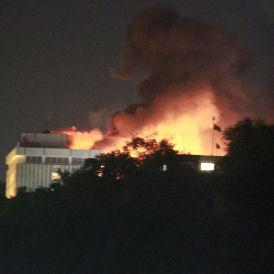Nato kills Kabul Intercontinental hotel attackers
A Taliban attack on a landmark hotel in Kabul has left nine people dead. An expert tells Channel 4 News the Taliban are staging “spectacular” attacks like this to show their continuing power.

The overnight assault by at least six Taliban suicide bombers, armed with rocket-propelled grenades and other weapons, lasted five hours before Nato helicopters killed the insurgents in a rooftop battle.
The attackers stormed the heavily guarded Intercontinental hotel in Kabul on Tuesday night, playing Taliban war songs and shooting at anyone they saw. Guests fled, some jumping from second and third floor windows to escape.
Eight Afghan civilians and police and one foreigner, confirmed as a Spanish civil aviation pilot by the Spanish Foreign Ministry, died in the attack. A further eight people were injured.
The attack was only stopped when some of the gunmen reached the roof, and Afghan officials requested help from the Nato-led International Security Assistance Force. The Nato helicopters then shot down the remaining attackers. Some are believed to have died during the initial surge into the hotel.
Professor Paul Rogers, an Afghanistan expert at the University of Bradford and an Oxford Research Group consultant, said the deadly attack was the Taliban reminding the UK and US that they are still a major force in Afghanistan.
He told Channel 4 News: “They are staging spectaculars like this to show their continuing power.”
The last big attack on a major Kabul hotel used by foreigners was in 2008, when Taliban gunmen killed six people in a raid. There have been insurgent attacks at a hotel, guesthouse and supermarket in Kabul over the past year, although the capital has been relatively quiet compared with the rest of Afghanistan, where violence has reached the worst levels since the conflict began in 2001.
The police are still searching the hotel for casualties or further threats.
Taliban ‘jostling for position’
The raid comes soon after President Barack Obama’s announcement that the United States plans to begin a staged troop withdrawal from Afghanistan and raises concerns over the ability of Afghan security forces to cope with this kind of attack.
But Afghan President Hamid Karzai said the withdrawal plan for US troops stood.
“This insurgent attack cannot stop our security transition process,” he said. UK Foreign Secretary William Hague said the UK and the Afghan people should not “let incidents such as these shake our joint resolve to build a safer and more secure Afghanistan.”
Some of the guests in the hotel, which is popular with VIPs and westerners, were provincial governors attending a conference due to begin on Wednesday on the transition of civil and military responsibility from foreign forces to Afghans.
Professor Rogers told Channel 4 News the Taliban wanted to remind the US that they were not “under control”.
Professor Rogers said: “We are moving towards a stalemate – and as the situation starts adjusting, both sides want to do that from a position of strength.
“That is why the Taliban are persistently staging spectaculars – they’ve tried to assassinate the French ambassador, the interior minister, and now this. The Taliban know they will never control the whole of Afghanistan again but they want a share of government. They are jostling for position, demonstrating they are still there.
“The US surge was the same thing – them wanting to negotiate from a position of strength, rather than destroying the Taliban, which is the attitude we would have seen if John McCain had won the election.”
He said over a five to ten year timetable, the United States may “have to compromise” with the Taliban and put up with their presence in government in some parts of Afghanistan – particularly because the US electorate no longer backs the war and US intelligence suggests more attention should be paid to Pakistan than Afghanistan, ten years on from 9/11.
